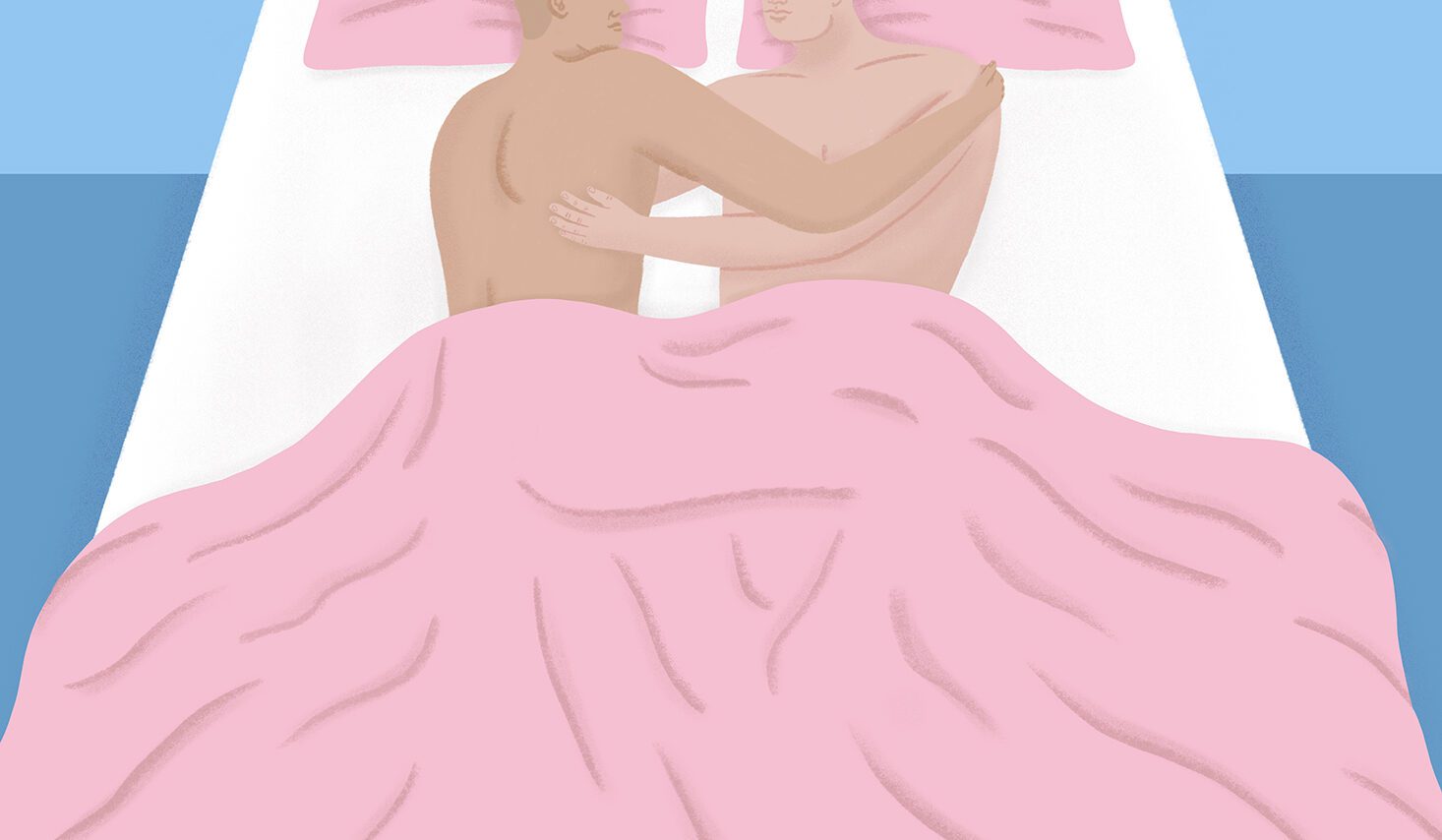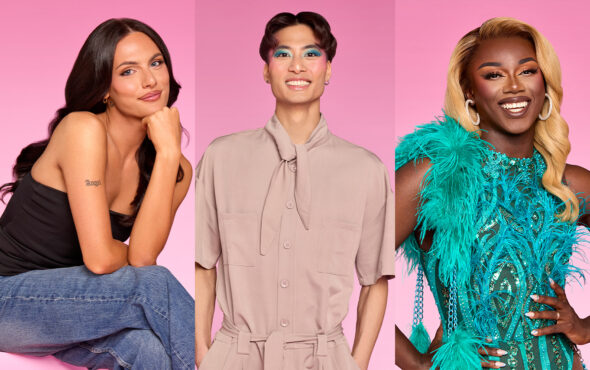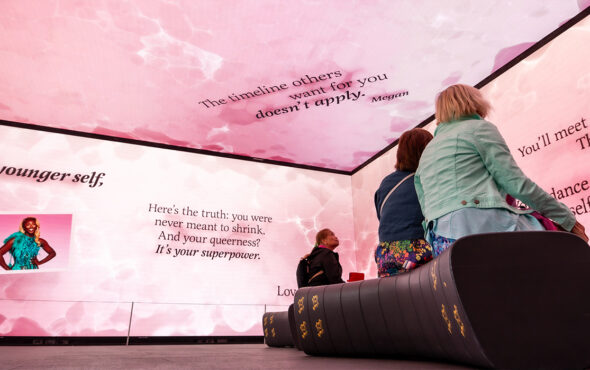
Intimate wellness brand Durex recently released the findings of its #MySexMyWay survey, a first-of-its-kind piece of research conducted earlier this year. The research sought to directly understand the experiences of LGBTQ+ people, revealing both the positive aspects of queer sex, but also the challenges we still face. GAY TIMES has teamed up with Durex to spotlight three young queer writers speaking of their own sexual experiences and how the findings of the #MySexMyWay survey reflect their own journeys, as a way to support others. You can find out more about the survey & results here.
Saying what I want has not always been easy. This has often translated to my sex life. As a queer and trans person, I have survived by making myself invisible and trying to take up as little space as possible. For a long time, I did this during sex as well – going through the motions, not communicating the things that made me feel good. After years of shying away from what I wanted, it took being with another trans person for me to open up about what my desires were, to get excited about what sex could be and to feel sexual pleasure in a way that was deeply emotionally intimate. I had a wall of shame that I had to push past, and once I got past it, sex became exciting and pleasurable in ways I couldn’t have imagined before.
It all started the first time I had sex with another trans person – it was magical. We checked in as we undressed each other, we asked each other what we needed and what we wanted, we held each other before and afterwards. It was more than just a hug to have his arms around me – we also held one another’s excitement and fear. We felt comfortable enough to try new things together, and we shielded each other from public spaces that haven’tn’t always been kind to us as trans people. He took time to get to know my body and all of the things that felt safe and good for me. We gave each other joy and celebration and it was really healing. I felt not only physically fulfilled, but emotionally fulfilled, also.
That relationship has set the bar for sex I’ve had since – I want sex that is communicative, thoughtful and celebrates my transness. I want sex that I can bring my whole self to. I want sex that makes me feel proud of and at home in my queerness.
I want this for everyone, so it was really amazing to find out that from an emotional/psychological perspective, 9 out of 10 LGBTQ+ people enjoy sex and find it fun and 82% feel accepted in sex by their partner, according to the results of Durex’s new #MySexMyWay survey. As queer and trans people, we are so often told to be ashamed of who we are and what we want sexually, so I’m happy that the majority of our community can find joy in sex, and also that we are finding acceptance with our partners. Sex can be a really exciting place for us to come together and care for each other, be proud of each other and ourselves and be celebrated for all the nuances of who we are.
I want sex that I can bring my whole self to. I want sex that makes me feel proud of and at home in my queerness.
The survey also found that 78% of LGBTQ+ people feel free to explore their sexual identity and orientation, something that isn’t generally easy for queer people. I know that to feel comfortable and confident sexually I have to feel comfortable and confident in myself, but this hasn’t always been easy.
Growing up queer and trans, you internalise shame from a very young age. The biggest moments of shame were around how others would perceive my gender and my sexual orientation, particularly in public places, and even more so in public spaces that were explicitly gendered. My biggest early memories of this are in the school changing rooms. I was assigned the girls changing room but I felt so out of place and all I could think of each PE class time was that everyone else would feel I was out of place, too. I used to try to find a corner to change in, face the wall, make myself as small as possible. I wanted to be invisible. Often, I would rush to get there early and get changed before anyone else arrived.
This shame carried into public bathrooms too. I have been told too many times to count to leave a public bathroom because something was being assumed about my gender. The violence has happened on the streets, it has happened in homes that I’ve lived in. And of course, the shame has carried through to sex, for a long time making me doubt my wants and desires, and in turn my own desirability.
As LGBTQ+ people, we often talk about the word “pride”, but what does it look like to be proud of how and who you have sex with, when there is so much shame attached to queer sex?
Part of this shame is in how queer and trans people are hidden. My current partner is genderqueer and I am non-binary, and the other day I was trying to recall if I had ever seen a genderqueer and non-binary person have sex on a TV show or in a film. There is no visibility of us. If you look at mainstream media, we don’t exist. There are hardly any trans or non-binary people at all in popular culture, let alone trans and non-binary people in healthy and happy relationships, or living healthy and enjoyable sex lives.
It can be both difficult and exciting to navigate sex when you have no representation – you don’t really have anything to look to form ideas about what your sex could be like. Sometimes this can be confusing and you just want a blueprint. This is where better sex and relationships education, visibility and sharing of community knowledge have big roles to play. But like I say, there’s also an excitement in sex that is a bit of a blank slate. Behind closed doors, without the straight cis gaze, we can love each other’s bodies really hard. We can decide for ourselves what sex looks like and means for us. Everything is effectively an experiment and an exploration, and when you are with someone you trust, trying things out can be really enjoyable.
Invisibility makes sexual health a murky area for us, too. As someone with a vagina who mostly has sex with people with vaginas, I was taught so little growing up about what contraception was out there for us. Hello dental dams! And forget any talk about pleasure, masturbation, or sex toys. Even discovering what lube was as a teenager felt like a revelation, but it took another queer teenager to show me – it was hopeless to expect to get any of my info from pop culture or sex education. Once again, everything I learnt about sex I learnt from and in the community – but we can’t depend on this. It takes time for most of us to find community and belonging. We need to be equipped with the tools and knowledge to live fulfilling sex lives from when we are young, so that we don’t spend years in the dark and at risk, learning as we go.
We need to be equipped with the tools and knowledge to live fulfilling sex lives
Another interesting finding from Durex’s #MySexMyWay survey is that 71% of LGBTQ+ people say they are satisfied with the physical aspects of their sex lives, but only 63% say they are satisfied with the emotional aspects. It seems as a community, we still have a lot to do to look after each other’s emotional wellbeing, especially during sex, which can often be such a vulnerable time. It’s different for everyone, but for me, personally, I don’t think I ever can be truly physically fulfilled without being emotionally fulfilled. It’s often the moments before and after sex that make it feel safe and enjoyable – checking in beforehand to learn each other’s desires and dislikes, the holding that happens afterwards, a space to be vulnerable and care for each other. This is what pushing aside shame looks like for me – creating spaces of vulnerability and freedom where we look after each other in response to the hostility we face.
For a long time, I’ve used sex as a coping mechanism. When strangers have spat at me on the street or I’ve been misgendered repeatedly at workplaces, I can always depend on the arms of a loved one to wrap me at the end of the day, hold my body close and love it well. Bring pleasure and safety back to my limbs. The way that queer people look after each other is part of what makes me proud to be queer.
But recently, I’ve been trying to see sex as far more than just a tool for coping. I’ve been trying to internalise sexual pride, both within myself and with my partner. Behind closed doors, we rewrite what it means for two bodies to come together. Without the straight cis gaze, we can love each other’s bodies really hard, and it feels celebratory and powerful. This is the kind of sex I want going forward, sex that is unashamedly brave and vulnerable, open and fluid.
I’m supporting Durex’s #MySexMyWay campaign because alongside The Proud Trust, HER, Grindr and a team of LGBTQ+ educators, Durex is working to share informative, inclusive and reliable resources about LGBTQ+ sex and relationships. Like Durex, I stand for a sex-positive society where everyone has the freedom, knowledge and tools to live their sex life their way. I want everyone to have sex that feels pleasurable, safe and free of shame.

